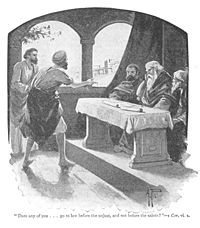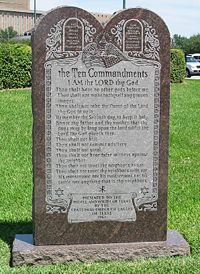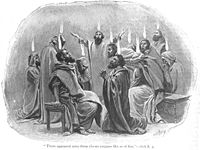| New Testament |
|---|
Paul’s first letter to the Corinthians is the first of two letters to the Christian church in Corinth that became part of the New Testament. It is one of the longest letters written by Paul, having 16 Chapters. Paul was the founder of the church in Corinth, spending more than a year there before going on to Ephesus (Acts 19:8-10, 20:31). At the time his letter was written, around 55 C.E., the church at Corinth was badly split and some of its members were in revolt against Paul and his teachings. Paul's letter is designed to answer questions put to him by members of the Corinthian church and to end some of the controversies which had divided the community there. It contains some of the most quoted verses in the Bible, especially its famous thirteenth chapter, dealing with the theme of love. It is also a rich source of information about the situation of the early church, Paul's role in it, and his attitude on a variety of theological and moral issues.
Paul's "second" letter to the Corinthians was also included in the New Testament, and an earlier letter is referred to in the current "first" letter. A purported third letter of Paul to the Corinthians was made part of the New Testament Apocrypha in the fourth century, but it was not canonized because it was thought to be a pseudepigraphical text written under the name of Paul. Originally it was part of the Book of Acts, but later it became detached and was renamed as third Corinthians.
Background
Corinth was a busy commercial city in Greece, and the center for Greek culture. Because of its central location and size, people and religious customs from different parts of the world converged. The early Christian church in Corinth had to contend with various pagan religious beliefs, ethical standards and customs.
While Paul was in Ephesus, he began to receive reports from Corinth of schisms in the church (1 Corinthians 1:11). Divisions within the church were splitting it into factions. Other questions that Paul had to deal with included the settling of disputes in courts, lack of church discipline, sexual immorality, an over-emphasis on the gift of tongues, questions about the wearing of veils by women, inappropriate drinking and feasting at celebration of the Lord's Supper. The climax of this letter is the famous chapter 13, where Paul emphasizes the importance of love, which he identified as the greatest of all spiritual gifts.
There is little doubt among scholars that Paul authored 1 Corinthians. However, some have argued that the letter, as well as 2 Corinthians, is actually a collection of multiple individual letters or fragments of letters. There has also been some debate among scholars whether certain passages in this letter, for example on the role of women, were actually the words of Paul, or were added on at a later time
Major Themes
Divisions Within The Church
Paul complained that there were four distinct factions within the Corinthian church, each claiming its own supposed leader: Paul, Apollos, Cephas, and "Christ." Each faction appealed to its particular leader as being superior to the other church leaders (1:10-4:21). Some followed Paul, the founder of the Corinthian church. Others followed Apollos (Acts 18:24), known for his eloquent speaking. Some thought that Peter, whose Greek name was Cephas, was the best qualified to lead the church, since he had been with Jesus. Others said that they would only follow Christ, lead by the Holy Spirit, and no one else.
Theological divisions underlying the loyalties of the members of the Corinthian church to different personalities are not clearly defined. However, since Paul dwells at some length on the issue of the gift of tongues and the work of the Holy Spirit, it is likely that those who refused to accept any authority but "Christ" were those who insisted on being led only by the spirit rather than respecting church elders or other authorities. Those who appealed to Peter rather than Paul may have been Jewish Christians, since Peter was the representative of the Jerusalem Church and had publicly disagreed with Paul over the question of relations between Jews and Gentiles (Galatians 3). Apollos was known as a gifted speaker, although his teachings are uncertain. Paul himself may have been seen as the particular leader of Gentile Christians, as he often identified himself as the "apostle to the Gentiles."
Paul begins his letter with reference to these conflicts and other serious spiritual problems within the Corinth church that had been reported to him from several sources (1 Cor. 1:11; 16:17). He chides the church, asking: "Is Christ divided? Was Paul crucified for you? Were you baptized into the name of Paul" (1 Cor. 1:13).
He states that the divisions within the church were causing "carnality" and stunted spiritual growth (1 Cor. 3:1-2), a loss of spiritual merit. Paul also heard that Corinthian church members were taking one another to the pagan courts to settle disputes (6:1-11). Disputes between church members should be settled peaceably without going to a civil court: ‚ÄúTo have lawsuits at all with one another is defeat for you. Why not rather suffer wrong? Why not rather be defrauded‚ÄĚ (1 Cor 6:7). Paul made it clear that Christians should never appear in pagan courts to settle disputes against one another (1 Cor. 6.4).
Paul however, did not insist that all members of the community need to think alike on every subject. But he did insist on unity of spirit and purpose that will allow each group to learn from each other: "I appeal to you, brethren, by the name of our Lord Jesus Christ, that all of you agree and that there be no dissensions among you, but that you be united in the same mind and the same judgment.‚ÄĚ (1 Cor. 1:10). He attempts to reinforce basic Christian teachings and beliefs, stating that God has given him the opportunity to be a ‚Äúskilled master builder‚ÄĚ by laying the foundation for others to build upon (1 Cor 3:10).
Paul's authority
Paul had strong opponents at Corinth. Although this is more fully discussed in Second Corinthians, the issue is also addressed here. Paul describes his central role in the founding of the church in Corinth (1 Cor 1:14-17; 2:1-5; 3:10; 4:12-13; 9:12-18; 16:15). He writes that he is the one who laid the foundation for the Corinthian church. Paul emphasize humility, stating that he came to Corinth "in weakness and in fear and in much trembling" and that his preaching was not impressive: "not with the eloquence of superior wisdom." Nevertheless, his message came to them "in a demonstration of the Spirit and with power" (1 Cor.9:12-18).
Paul intends to send Timothy as his representatives in Corinth, whom he calls "my son, whom I love, who is faithful in the Lord." Timothy with act to uphold the authority of Paul's teaching:
He will remind you of my way of life in Christ Jesus, which agrees with what I teach everywhere in every church. Some of you have become arrogant, as if I were not coming to you. But I will come to you very soon, if the Lord is willing, and then I will find out not only how these arrogant people are talking, but what power they have. For the kingdom of God is not a matter of talk but of power. What do you prefer? Shall I come to you with a whip, or in love and with a gentle spirit? (I Cor. 18-24)
Sexual morality
The church at Corinth had members from many different cultural backgrounds with their own standards of morality. This caused a head-on collision with Christian standards of morality, which is one of the main topics discussed by Paul. Although he insists on the freedom of Christians from the Law of Moses, he by no means intends that this includes freedom to disobey the commandments against adultery, fornication, or incest.
Paul had heard that there was a man in the church who was having sexual relations with his father's wife‚ÄĒor possibly had married her after his father's death‚ÄĒand this was apparently approved by other Corinthian church members. These members boasted that what this person was doing was an expression of Christian freedom (1 Cor. 5:1-13). Paul passes judgment on this person insisting that he be "handed over to Satan" and that no member of the church should associate with such a person. To Paul, all immorality is grievous sin against Christ. Believers are Christ's members and their bodies are the temples of the Spirit (1 Cor. 6.9-20).
Any type of immoral conduct must not be tolerated among church members. If anyone persists in following the immoral standards of the pagans, they should be excluded from church membership. Paul realizes that some association with these people cannot be totally avoided in the city of Corinth, but it cannot be permitted to exist within the church. ‚ÄúDon‚Äôt you know that a little yeast works through the whole batch of dough?" he asks. "Get rid of the old yeast that you may be a new batch without yeast‚ÄĒas you really are.‚ÄĚ
Paul also had to deal with the problem of prostitution. Evidently some of the Corinthian Christians were going to prostitutes and justifying their conduct on the grounds of their liberty in Christ and that is was a natural use of their body (I Cor 6:12-20). Paul declares:
Everything is permissible for me, but not everything is beneficial... Do you not know that your bodies are members of Christ himself? Shall I then take the members of Christ and unite them with a prostitute? Never! (I Corm 12-15)
Paul points out hunger and sexual desire are normal desires, but they cannot be abused. Otherwise, as Paul says, one can become enslaved to the power of the prostitute rather than Christ (1 Cor. 6:9-20). Paul explains that being joined to a prostitute is actually harmful to the body, and we have responsibility to take care of our bodies as they are the temple of the Holy Spirit (1 Cor. 6:19).
Paul viewed marriage primarily in the light of his belief in the imminent advent of a new world (1 Cor. 7:29-31), believing that Christ would be returning soon. He exhorted Corinthian Christians to avoid any entanglement, marriage that might ‚Äúput an obstacle in the way of the gospel of Christ‚ÄĚ (1 Cor. 9:12). With this conviction and concern in mind, Paul preferred and advocated celibacy (1 Cor. 7:7-8). To those, however, who cannot bear it, his advice is ‚ÄúBut if they cannot exercise self-control, they should marry. For it is better to marry than to be aflame with passion‚ÄĚ (1 Cor. 7:9).
Paul also deals with the situation where a believer is married to an unbeliever. God does not want the believer to leave his or her mate. God’s will is not divorce. Instead, the Christian spouse should try to live with the spouse who is not a believer and try to win this person over to Christ. Paul says that whatever circumstance a person was in when he or she became a Christian, remain in them. Christianity is not designed to take people out of the world, but to help us live in it.
Several criticisms were directed towards women. Paul criticizes the Corinthians for allowing certain women to violate standards of decency with respect to dress (1 Cor. 11:2-34), he rebukes women in the church who were being disruptive during meetings, those women who were forgetting their subjective role to men, and those who were prophesying or praying and not covering their head which was the normal practice within the church (1 Cor. 11:16).
Food sacrificed to idols
Christian life in a pagan society raised many problems, especially fellowship with pagans, which involved the eating of meat offered in pagan temples. In addition, butchers in the ancient world slaughtered their meat ritually, and thus meat sold in butcher shops might actually have been "sacrificed," even though not publicly.
The Corinthians sought his agreement that eating meat sacrificed to idols was not only harmless but actually an exercise of a Christian freedom, as opposed to the Jewish commandment to refrain from all but kosher food. Paul agreed that idols are really nothing, but nevertheless instructed them to forgo the exercise of their freedom for the sake of those who do not know that idols are nothing.
He used himself as an example for them to follow: he had certain rights as an apostle, but refused to exercise these rights for the sake of being a more effective apostle. Christian love imposes voluntary restriction on personal conduct (1 Cor. 8: 1-11; 19-23).
Near the end of his rather lengthy discussion of this topic, Paul seemingly reverses himself and argues that food offered to idols in pagan temples is indeed offered to real demonic powers. He therefore warns the Corinthians not to participate in pagan feasts because:
The sacrifices of pagans are offered to demons, not to God, and I do not want you to be participants with demons. You cannot drink the cup of the Lord and the cup of demons too; you cannot have a part in both the Lord's table and the table of demons (I Cor. 10:20-21).
He concludes with an appeal to do all "for the glory of God" and for the sake of one's fellow human. "If some unbeliever invites you to a meal and you want to go, eat whatever is put before you without raising questions of conscience," he advises. However, if a Christian is informed that the meat was sacrificed to an idol, he should not eat of it, not because the meat defiles the Christian, but because the Christian must not encourage idolatry.
The Lord’s Supper
Paul was also concerned with the tradition of the Lord's Supper (1 Cor. 11:2-34) in Corinth. Some members were abusing the feast‚ÄĒwhich was at this time not yet a formal communion service but apparently an actual meal commemoration the Last Supper‚ÄĒa time of special remembrance of Christ and his last meeting with his disciples. Paul complains that in Corinth, each of you goes ahead without waiting for anybody else; one remains hungry, another gets drunk." Paul concludes that "When you come together to eat, wait for each other. If anyone is hungry, he should eat at home." The passage is also important in that it provides the earliest known tradition concerning the Last Supper, Paul's view of its significance, and one of the few instances in which Paul quotes at some length from the purported words of Jesus.
Spiritual Gifts
The value of spiritual gifts among various members of the church had also become a problem. Many Corinthian church members emphasized their gift of being able to speak in tongues, viewing it as proof of their spirituality and superiority over those who could not speak in tongues. Worship services were apparently thrown into disorder by those who felt themselves inspired by the Holy Spirit and refused to respect the authority of service leaders, prompting Paul's famous comment: "God is not the author of confusion, but of peace" (1 Cor. 14:33).
Paul deals with the issue through an analogy with the human body, in which each organ has its special function to perform. The same principle applies within the church, which is the "body of Christ." Some members have the gift of prophecy, others that of teaching, healing, or offering help in carrying forward the work of the church. No one should think of himself as superior to those who exercise other gifts, for all gifts are necessary; and the church would not be able to function if any of them were missing. Paul writes that the gift of tongues, like all of the others, should be evaluated in terms of its usefulness in promoting the Christian way of life. He says it is better to speak a few words that will be understood by others than to speak at great length in an unknown tongue that is quite unintelligible to those who hear it.
By way of illustration, Paul gives the analogy of music and concludes that as music without melody is useless (1 Cor.12:7-8), so is the speaking in tongues useless if it is not understood by others. Paul also reminds the members that God prefers the weak and humble and insignificant people of the world, because they do not depend on their own ability, but on God‚Äôs power (1 Cor. 1:26-29; 4:9-13; 12:23-24). He stops short of forbidding glossolalia in church, but states: "If anyone speaks in a tongue, two‚ÄĒor at the most three‚ÄĒshould speak, one at a time, and someone must interpret. If there is no interpreter, the speaker should keep quiet in the church and speak to himself and God" (14:27-28).
Love
The thirteenth chapter of 1 Corinthians, motivated by Paul's desire to teach his flock that the "higher gifts"‚ÄĒfaith, hope, and love‚ÄĒare to be preferred, is one of the most quoted chapters of the Bible. It honors love as the most important spiritual gift a person can receive.
If I speak in the tongues of men and of angels, but have not love, I am only a resounding gong or a clanging cymbal. If I have the gift of prophecy and can fathom all mysteries and all knowledge, and if I have a faith that can move mountains, but have not love, I am nothing. If I give all I possess to the poor and surrender my body to the flames, but have not love, I gain nothing.
Love is patient, love is kind. It does not envy, it does not boast, it is not proud. It is not rude, it is not self-seeking, it is not easily angered, it keeps no record of wrongs. Love does not delight in evil but rejoices with the truth. It always protects, always trusts, always hopes, always perseveres. Love never fails. But where there are prophecies, they will cease; where there are tongues, they will be stilled; where there is knowledge, it will pass away. For we know in part and we prophesy in part, but when perfection comes, the imperfect disappears.
When I was a child, I talked like a child, I thought like a child, I reasoned like a child. When I became a man, I put childish ways behind me. Now we see but a poor reflection as in a mirror; then we shall see face to face. Now I know in part; then I shall know fully, even as I am fully known.
And now these three remain: faith, hope and love. But the greatest of these is love (1 Cor. 13:1-12).
The Resurrection
Apparently some Corinthians were denying the resurrection of Jesus (1 Cor. 15:12). Paul responds that if there was no resurrection, then Christ died for nothing; and ‚Äúwe are of all men most to be pitied‚ÄĚ (1 Cor. 15:19), because the sacrifices made for Christ in this life would also be for nothing. "If there is a natural body," he says, "there is also a spiritual body" (I Cor. 15:44). Paul argues that Jesus' resurrection was merely the ‚Äúfirst fruits‚ÄĚ of a process in which all Christians will eventually participate. Christ‚Äôs resurrection was the basis for our own victory and hope.
Paul concludes his letter with an appeal for funds that will be set aside each week for an offering that Paul hopes to send the Jerusalem church.
Significance
Paul's First Letter to the Corinthians is one of the New Testament's richest sources of information about the character of the Pauline churches. No other letter deals with such a diversity of moral, theological, and practical issues. While it lacks the theological depth of Romans, the passion of Galatians, or the joy of Philippians, it is perhaps the most revealing of all the Pauline epistles.
Paul's chapter on love (1 Cor. 13) and the passage on immortality (1 Cor. 15:35-55) are among the most quoted passages in the Bible. His use of the analogy of the body of Christ as an analogy of the church became a lasting archetype of Christian unity, which‚ÄĒeven though was never achieved in history‚ÄĒremains a symbol of ecumenical hope. It is also in Corinthians that Paul expressed his preference for celibacy (7:7-8). His exhortation to Christians to avoid any entanglement, marriage included, that might ‚Äúput an obstacle in the way of the gospel of Christ‚ÄĚ (9:12) became the rallying cry for the ascetic impulse within the Christian Church, and eventually led to an encyclical by Pope Gregory VII, almost 1000 years later, prohibiting marriage for the clergy. At the same time, his grudging acceptance of marriage, combined with his absolute opposition to fornication, prostitution, and adultery, set the tone for traditional Christian sexual mores to this day. His advice to control spontaneous charismatic outbursts in church served to justify the repression of glossolalia until the emergence of the Pentecostal movement in the twentieth century. Moreover, Paul's beliefs concerning the crucifixion (1:18-2:2) and the resurrection (1 Cor.15) have, from the beginning, profoundly influenced Christian thought.
The First Letter to the Corinthians is certainly one of the most important works of New Testament literature.
ReferencesISBN links support NWE through referral fees
- Barclay, William. The Letters to the Corinthians. The Daily study Bible series. Philadelphia: Westminster Press, 1975. ISBN 9780664241087
- Keener, Craig S. 1‚ÄĒ2 Corinthians. New Cambridge Bible commentary. Cambridge, UK: Cambridge University Press, 2005. ISBN 9780521834629
- Laymon, Charles, (ed.). The New Interpreter's Bible: General Articles & Introduction, Commentary, & Reflections for Each Book of the Bible, Including the Apocryphal/Deuterocanonical Books. Nashville: Abingdon Press, 1994. ISBN 9780687278145
- Stedman, Ray C., and James D. Denney. Letters to a Troubled Church: Studies in 1 and 2 Corinthians. Grand Rapids, Mich: Discovery House Publishers, 2007. ISBN 9781572932555
This entry incorporates text from the public domain Easton's Bible Dictionary, originally published in 1897.
External links
All links retrieved November 28, 2024.
- Early Christian Writings: 1 Corinthians ‚Äď www.earlychristianwritings.com.
| |||||||||||||||||
Credits
New World Encyclopedia writers and editors rewrote and completed the Wikipedia article in accordance with New World Encyclopedia standards. This article abides by terms of the Creative Commons CC-by-sa 3.0 License (CC-by-sa), which may be used and disseminated with proper attribution. Credit is due under the terms of this license that can reference both the New World Encyclopedia contributors and the selfless volunteer contributors of the Wikimedia Foundation. To cite this article click here for a list of acceptable citing formats.The history of earlier contributions by wikipedians is accessible to researchers here:
The history of this article since it was imported to New World Encyclopedia:
Note: Some restrictions may apply to use of individual images which are separately licensed.




